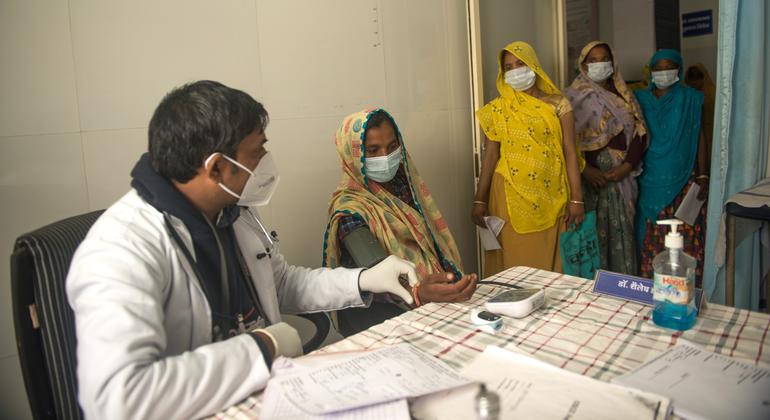According to the UN health agency, health aid from abroad is expected to see a drop of between 30 and 40 percent this year compared to 2023.
This has already resulted in reductions of up to 70 percent in key health services in some of the 108 low- and middle-income countries featured in a new WHO report.
More than 50 of those nations also reported job losses among health and care workers, the UN agency noted, a situation exacerbated by years of financial strain driven by inflation, government debt repayments and a heavy reliance on external aid.
Critical services such as maternal care, vaccination and disease surveillance are at risk in many low- and middle-income countries, the WHO has warned.
Life lost
WHO chief Tedros Adhanom Ghebreyesus said “sudden and unplanned aid cuts” have already hit many countries hard, “costing lives and jeopardizing hard-won health gains”.
But he added that now was the time for countries to shift away from “aid dependency” to “sustainable self-reliance” by using domestic resources to focus on protecting the most vulnerable.
Several countries are already taking action. Nigeria has increased its health budget by $200 million to offset cuts in external funding, while Ghana has lifted the ceiling on excise revenue to boost its national health insurance fund by 60 percent.
The WHO said such steps show that national leadership and global solidarity are essential to sustaining health systems in a new era of limited aid.
Türk welcomes Australia’s first treaty with indigenous peoples
UN human rights chief Volker Türk on Monday welcomed Australia’s first formal treaty with indigenous peoples, describing it as an “important step towards justice and equality” and a “significant event for all Australians.”
Passed by the legislatures of the state of Victoria, the treaty establishes a democratically elected First People’s Assembly – the Gellung Warl – along with a “truth-telling” body, called Nyerna Yoorrook Telkuna, and an accountability body, known as Nginma Ngainga Wara.
Mr. Türk said the initiative marks an important step towards self-determination for the country’s first peoples, addressing the “continued exclusion and discrimination” stemming from colonization.
Historic step, ‘truly transformative’
In his statement, he added that Victoria’s approach could be “truly transformative” if fully implemented, ensuring Indigenous communities have a direct voice in shaping laws and policies that affect their lives.
The move follows the 2017 Uluru Declaration from the Heart, which called for constitutional recognition and a voice for Indigenous Australians. Mr. Türk expressed hope that Victoria’s example would inspire similar actions elsewhere in Australia and beyond, promoting reconciliation and respect for human rights for all.
About a quarter of Australia’s population lives in the state of Victoria.
Haiti: Independent UN experts warn that women’s exclusion is exacerbating the crisis
Independent UN human rights experts have warned that Haiti’s deepening crisis cannot be resolved while women remain excluded from decision-making and exposed to widespread sexual violence.
“Haiti is in the grip of one of the world’s most serious crises, and women and girls bear the brunt,” said the UN Working Group on Discrimination against Women and Girls. “Yet they remain sidelined from processes that determine their safety, rights and future.”
In Haiti, people carrying their belongings flee their homes as night falls due to violence.
Experts appointed by the UN Human Rights Council said women are completely absent from Haiti’s transitional leadership, where all seven voting members of the presidential council are men and the new cabinet does not meet the constitutional quota of 30 percent female representation.
“Haitian women have long played a vital role in rebuilding communities and supporting social cohesion,” the group said. “Their exclusion is not only unfair – it is a strategic failure.”
‘Terror Weapons’
Criminal gangs continue to use sexual violence as a “weapon of terror”, particularly in the capital Port-au-Prince, while survivors are left without protection or justice.
The experts called on the Haitian authorities and international partners to act immediately to ensure women’s equal participation in political, security and recovery processes, warning that “Haiti’s crisis cannot be resolved without confronting the gendered dynamics of violence and governance.”



